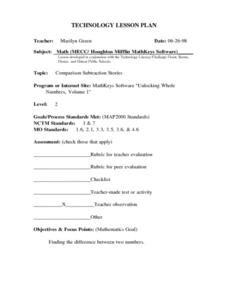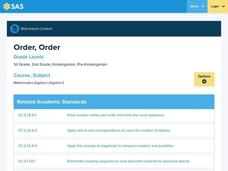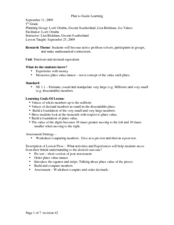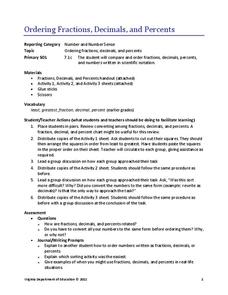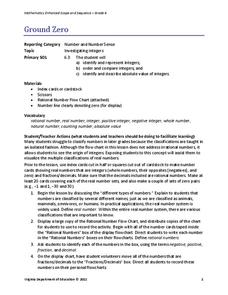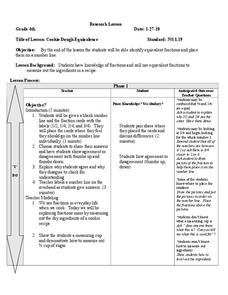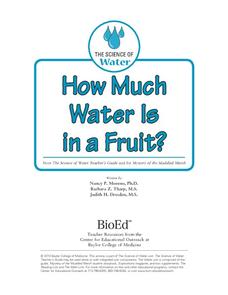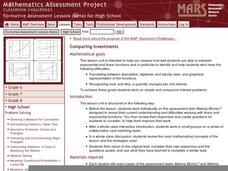Curated OER
Big Boats Up The River
Using boats along in the Port of Albany as the focus, learners practice adding single-digit numbers and interpreting data. This lesson plan comes with the worksheets, resource links, and other materials to make it a worthwhile experience.
Curated OER
Comparison Subtraction Stories
Second graders create stories that model comparison subtraction while using the environmental mats. They suggest situations in which they compare numbers. For example, if one student has 6 nickels and another child has 14 nickels,...
Pennsylvania Department of Education
Order, Order
Students use pictures to identify items as ordinal numbers. In this ordinal numbers lesson plan, students use the words "before" and "after" to identify the pictures as well.
Curated OER
Compare Fractions Using Fraction Circles
Fourth graders practice ordering fractions using models and drawings. For this math model lesson, 4th graders utilize colored blocks and drawings to show an equal representation of given fractions. Students compare and contrast the...
Curated OER
Comparing Weights And Volumes
Students engage in a lesson that is focused upon the concept of weights and measures. They conduct experiments while classifying the quantities of different sized containers. Students compare and convert measurements like liters to...
Curated OER
Finding Addition Patterns
Students practice finding the sums of two-one digit numbers. In this addition lesson plan, students also record facts onto an addition chart.
Curated OER
Mental Math Blocks
In this mathematics worksheet, pupils solve various types of problems in each of the squares. They use symbols to compare numbers. They also divide and multiply.
Curated OER
Fractions and Decimal Equivalents: Fifth Grade
Sometimes a skeleton is all you get. This lesson outline provides teachers with a basic lesson flow. Pupils will pre-test, order place value names, use manipulatives, and build and compare numbers. How this is to be done is not...
Virginia Department of Education
Ordering Fractions, Decimals, and Percents
Order up a resource on comparing rational numbers. Scholars order fractions, decimals, and percents by converting to a single form. They conduct a cut-and-paste activity ordering three sets of rational numbers.
Virginia Department of Education
Ground Zero
Don't harbor any negative feelings toward negative numbers. Scholars learn about different classifications of rational numbers, including negative integers. They also develop definitions of the opposite and the absolute value of a...
Virginia Department of Education
Rational Speed Matching
Ready, set, go! Individuals practice converting rational numbers between fractions, decimals, and percents. A speed game has teams match the three forms of rational numbers on a number line.
Curated OER
Cookie Dough Equivalence
Who doesn't love cookies? In this lesson, learners follow a recipe to make cookies, practicing their ability to compare fractions as they go. This is a wonderful way to motivate your class to practice this important skill.
Curated OER
100th Day Celebration
Learners celebrate the 100th day of school with a variety of math and language arts activities based on the number 100. They make books, count objects, and draw their predictions about life 100 years from now. They also estimate the time...
Curated OER
Integers
In this integers worksheet, students evaluate numbers and equations and fill in the correct comparing symbols. Students complete 16 questions total.
Curated OER
Count on Chinese Characters
Students research and use traditional Chinese characters to notate numbers. They compare and contrast Chinese calligraphy with Arabic numerals. Students demonstrate their comprehension of number concepts through their drawings and...
Mathematics Assessment Project
Comparing Strategies for Proportion Problems
Having problems with proportions? Then solve these proportion problems with an exercise that asks learners to first individually solve a set of problems involving ratios and proportional reasoning. Groups then discuss provided sample...
Center for Mathematics and Technology
Whole Numbers: Using an Area Model to Explain Multiplication
There are many ways to work through a multiplication problem. Using an area model, kids complete several worksheets with different types of multiplication problems, including multiplying by ten, and explain how the new strategies differ...
Illustrative Mathematics
Cooking with the Whole Cup
Whoops! Travis accidentally put too much butter into the recipe. Your bakers must find out how to alter the recipe to accommodate different changes by using unit rates and ratios . The activity has multiple parts and calculations with...
EngageNY
Grade 5 Math Module 1, Topic F, Lesson 14
Be sure to place value on place value understanding. Young mathematicians learn to divide decimals by whole numbers when compatible numbers are not available. They use place value discs in place value charts, then connect this strategy...
Illustrative Mathematics
Banana Bread
Show your future bakers how to choose the right baking pan by calculating the volume of a pan. The resource compares two pans, one with decimal edge lengths and is too small for the recipe and one that may work. Your number crunchers are...
Baylor College
How Much Water Is in a Fruit?
Compare the volume of an orange to the volume of liquid that can be extracted out of it. Also compare the mass of an apple before and after it has been dried out. In both of these activities, children find that there is an appreciable...
Scholastic
Dear Miss Breed
This compelling plan based on the letters in the book Dear Miss Breed engages readers in learning what it was like for Japanese Americans following the attacks at Pearl Harbor. After reading the letters, young scholars will partake in...
EngageNY
The Multiplication of Polynomials
If you can multiply multi-digit integers, you can multiply polynomials. Learners use an area model to compare multiplying numbers to multiplying polynomials. They progress to using the distributive property.
Curated OER
Comparing Investments
Money, money, money. A complete lesson that makes use of different representations of simple and compound interest, including written scenarios, tables, graphs, and equations to highlight similarities and differences between linear and...
Other popular searches
- Compare Numbers to 20
- Compare Numbers to 999
- Compare Numbers Lesson Plans
- Compare Numbers to 1000
- Compare Numbers 1 10
- Estimate and Compare Numbers
- Compare Numbers 1 5
- Compare Numbers 1 20
- Compare Four Digit Numbers
- Order and Compare Numbers
- Compare Numbers to 10
- Math Compare Numbers



